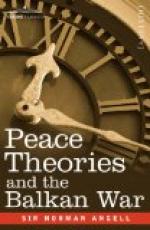Now in all this the Times, especially in one outstanding central idea, is embodying a conception which is the antithesis of that expressed by Militarists of the type of Mr. Churchill, and, I am sorry to say, of Lord Roberts. To these latter war is not something that we, the peoples of Europe, create by our ignorance and temper, by the nursing of old and vicious theories, by the poorness and defects of the ideas our intellectual activities have developed during the last generation or two, but something that “comes upon us” like the rain or the earthquake, and against which we can only protect ourselves by one thing: more arms, a greater readiness to fight.
In effect the anti-Educationalists say this: “What, as practical men, we have to do, is to be stronger than our enemy; the rest is theory and does not matter.”
Well the inevitable outcome of such an attitude is catastrophe.
I have said elsewhere that in this matter it seems fatally easy to secure either one of two kinds of action: that of the “practical man” who limits his energies to securing a policy which will perfect the machinery of war and disregard anything else; or that of the idealist, who, persuaded of the brutality or immorality of war, is apt to show a certain indifference concerning self-defence. What is needed is the type of activity which will include both halves of the problem: provision for education, for a Political Reformation in this matter, as well as such means of defence as will meantime counterbalance the existing impulse to aggression. To concentrate on either half to the exclusion of the other half is to render the whole problem insoluble.
What must inevitably happen if the nations take the line of the “practical man,” and limit their energies simply and purely to piling up armaments?
A critic once put to me what he evidently deemed a poser: “Do you urge that we shall be stronger than our enemy, or weaker?”
To which I replied: “The last time that question was asked me was in Berlin, by Germans. What would you have had me reply to those Germans?”—a reply which, of course, meant this: In attempting to find the solution of this question in terms of one party, you are attempting the impossible. The outcome will be war, and war would not settle it. It would all have to be begun over again.
The Navy League catechism says: “Defence consists in being so strong that it will be dangerous for your enemy to attack you."[11] Mr. Churchill, however, goes farther than the Navy League, and says: “The way to make war impossible is to make victory certain.”




